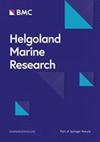升高的温度和沉积对绿海胆放牧率的影响:对因气候变化而暴露于沉积增加的海带森林的影响
4区 地球科学
Q2 Agricultural and Biological Sciences
引用次数: 4
摘要
海胆放牧率会强烈影响海带床的持久性。与气候变化相关的水温升高可能会增加放牧率;然而,这些影响可能与局部压力因素相互作用,如沉积,这可能会抑制放牧。在阿拉斯加,冰川融化随着气候变化而增加,导致沉积速率升高,这通常与食草动物丰度降低和大型藻类物种组成的变化有关。2017年5月初,在阿拉斯加Kachemak湾(59°37′45.00″N, 151°36′38.40″W)研究了温度和沉积物升高对绿海胆(strongylocentrrotus droebachiensis, O.F. m本文章由计算机程序翻译,如有差异,请以英文原文为准。
Effects of elevated temperature and sedimentation on grazing rates of the green sea urchin: implications for kelp forests exposed to increased sedimentation with climate change
Sea urchin grazing rates can strongly impact kelp bed persistence. Elevated water temperature associated with climate change may increase grazing rates; however, these effects may interact with local stressors such as sedimentation, which may inhibit grazing. In Alaska, glacial melt is increasing with climate change, resulting in higher sedimentation rates, which are often associated with lower grazer abundance and shifts in macroalgal species composition. The short-term effects of elevated temperature and sediment on grazing were investigated for the green sea urchin, Strongylocentrotus droebachiensis (O.F. Müller, 1776), in Kachemak Bay, Alaska (59° 37′ 45.00″ N, 151° 36′ 38.40″ W) in early May 2017. Feeding assays were conducted at ambient temperature (6.9–9.8 °C) and at 13.8–14.6 °C with no sediment and under a high sediment load. Grazing rates significantly decreased in the presence of sediment, but were not significantly affected by temperature. Along with sediment impacts on settlement and post-settlement survival, grazing inhibition may contribute to the commonly observed pattern of decreased macroinvertebrate grazer abundance in areas of high sedimentation and increased sedimentation in the future may alter sea urchin grazing in kelp forests.
求助全文
通过发布文献求助,成功后即可免费获取论文全文。
去求助
来源期刊

Helgoland Marine Research
地学-海洋学
自引率
0.00%
发文量
0
审稿时长
6-12 weeks
期刊介绍:
Helgoland Marine Research is an open access, peer reviewed journal, publishing original research as well as reviews on all aspects of marine and brackish water ecosystems, with a focus on how organisms survive in, and interact with, their environment.
The aim of Helgoland Marine Research is to publish work with a regional focus, but with clear global implications, or vice versa; research with global emphasis and regional ramifications. We are particularly interested in contributions that further our general understanding of how marine ecosystems work, and that concentrate on species’ interactions.
 求助内容:
求助内容: 应助结果提醒方式:
应助结果提醒方式:


